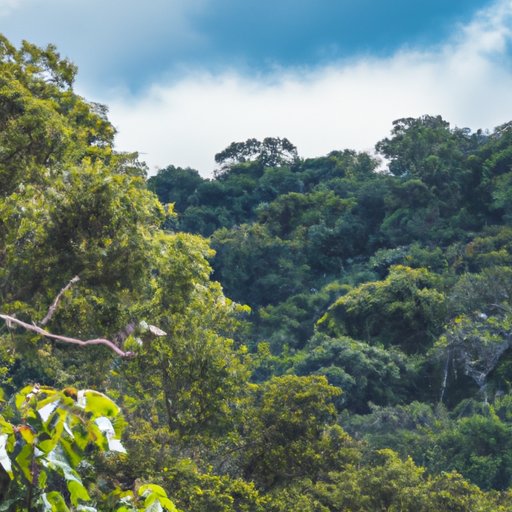I. Introduction
Biodiversity, which refers to the variety of life on Earth, is vital for the long-term health and sustainability of our planet. It encompasses all living organisms, from the smallest microbe to the largest mammal, and the complex systems in which they live. Understanding the importance of biodiversity is essential for creating and implementing effective conservation strategies that protect natural habitats, promote sustainability, and improve the well-being of all living creatures. In this article, we will explore why biodiversity is important for the environment, economy, culture, and human rights.
II. Importance of Maintaining a Balanced Ecosystem
A balanced ecosystem includes a wide variety of species that interact with each other in complex ways. Each species plays a vital role in its environment, and the loss of one can affect the entire system. For example, bees and other pollinators are indispensable for the reproduction of many plant species, including crops that provide food for humans and animals. Without pollinators, we would face food shortages and an imbalance in the natural world.
Biodiversity also promotes environmental stability by supporting ecosystems’ resilience in the face of environmental pressures such as droughts, floods, and temperature extremes. The greater the number of species in a habitat, the greater its resilience and ability to recover from disturbances such as natural disasters and human-caused changes. For example, a diverse coral reef has a better chance of recovering from a catastrophic event such as a cyclone than a less diverse reef.
III. Economic Benefits of Biodiversity
Human societies depend on natural resources provided by ecosystems for economic and social development. These resources include timber, fibers, berries, medicinal plants, fish, and wildlife, among others. The value of these ecosystem services is often higher than direct exploitation and use, such as logging and hunting. For example, bees contribute to pollination, which, in turn, provides ecological benefits such as water filtration, pest control, and nutrient cycling that support agriculture, forestry, and fisheries.
Biodiversity also presents opportunities for economic development by providing new products derived from natural sources. Examples may include biodegradable materials from plant matter and fungi, and chemicals to treat illness from plants and microbes. Another example is eco-tourism, which involves visits to natural areas that protect habitats and promote conservation.
IV. Cultural and Spiritual Significance of Biodiversity
Biodiversity resources have immense cultural and spiritual significance to indigenous communities worldwide. Their reliance on natural resources has led to a wealth of knowledge and practices that contribute to the sustainable management of ecosystems. At the same time, it highlights the need to preserve traditional knowledge and practices to ensure that ecosystems remain adequate and provide for future generations.
Indigenous peoples offer incredible examples of how one can protect nature that is more sustainable than extractive and destructive developmental projects. The forests that the tribes protect in Brazil, for example, are essential for combating climate change. Similar efforts have been carried out in the Amazon, India, and many other areas of the world. One of the most crucial ways to preserve cultural diversity is to act quickly to prevent biodiversity loss. By partnering with and investing in indigenous and local communities, we can develop conservation solutions that incorporate local knowledge, enable human rights, and conserve biodiversity.
V. Biodiversity as a Human Rights Issue
Biodiversity loss and habitat destruction impact vulnerable communities in numerous ways, including increased poverty, decreased food security, and loss of access to clean air and water. Some people are directly impacted by the loss of natural systems they have relied upon for generations. Climate refugees are also affected by conservation problems, as they lose the ability to sustainably support themselves. Conservation efforts must be carried out while respecting and protecting marginalized groups’ rights.
VI. Biodiversity’s Role in Mitigating Climate Change
Biodiversity plays a crucial role in mitigating climate change through carbon storage. When ecosystems are healthy, they can store large amounts of carbon dioxide and other greenhouse gases. When forests are cut or converted to other land uses, carbon is released into the atmosphere, thus increasing greenhouse gas concentrations and accelerating global warming.
Climate change also contributes to biodiversity loss by altering habitats and species’ ranges and survival rates. For example, Arctic ice is melting rapidly, causing polar bears to be stranded on ice islands, while many plants and bugs are struggling to adapt to the warmer temperatures that are disrupting their life cycles.
VII. Ethical Considerations in Protecting Biodiversity
Protecting biodiversity requires taking into account moral and ethical considerations, such as environmental stewardship, responsibility, and obligations to future generations. Endangered and extinct species undermine the ethical principle of protecting species’ intrinsic value. The extinction of one species may lead to the extinction of other species and ecological systems’ ultimate collapse.
Moreover, ethical considerations require consideration of biodiversity conservation’s distributive justice effects. For example, avoiding deforestation’s harmful effects on forests can drive costs that put poor farmers and indigenous people in an unfair position. Costly forms of development can also threaten vulnerable people and communities in the hopes of progress.
VIII. Conclusion
In conclusion, biodiversity is crucial to maintaining a stable environment, benefiting human health and well-being, providing economic benefits, preserving cultural and spiritual significance, respecting and protecting human rights, mitigating climate change, and promoting ethical and moral considerations. While the importance of biodiversity needs to be understood, it is essential to act in ways that protect and conserve life on Earth. We all play a role in protecting biodiversity, from individuals making conscious consumer choices to voting for political leaders and engaging in conservation campaigns.
Supporting conservation organizations, reducing carbon footprints, living a sustainable lifestyle, valuing eco-friendly products, and educating yourself and others on environmental issues are all ways to promote biodiversity and create a better future for all living beings.
